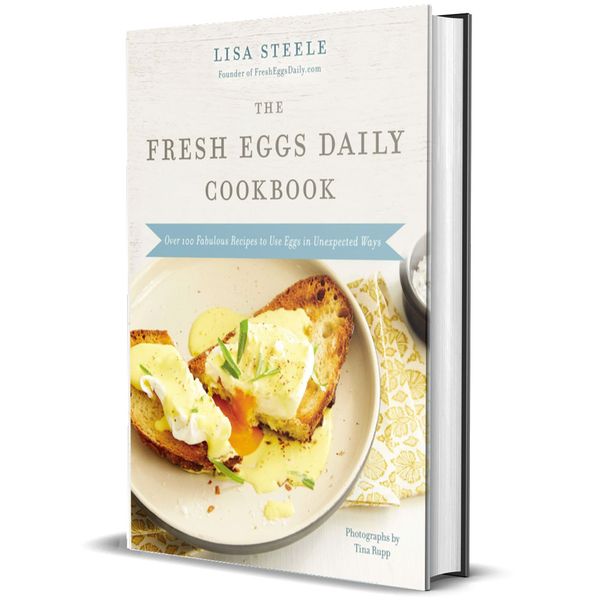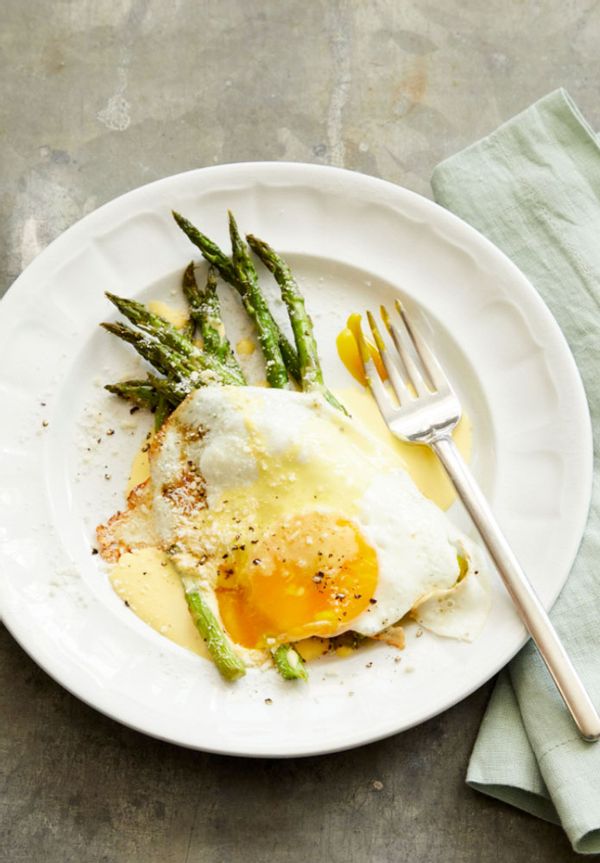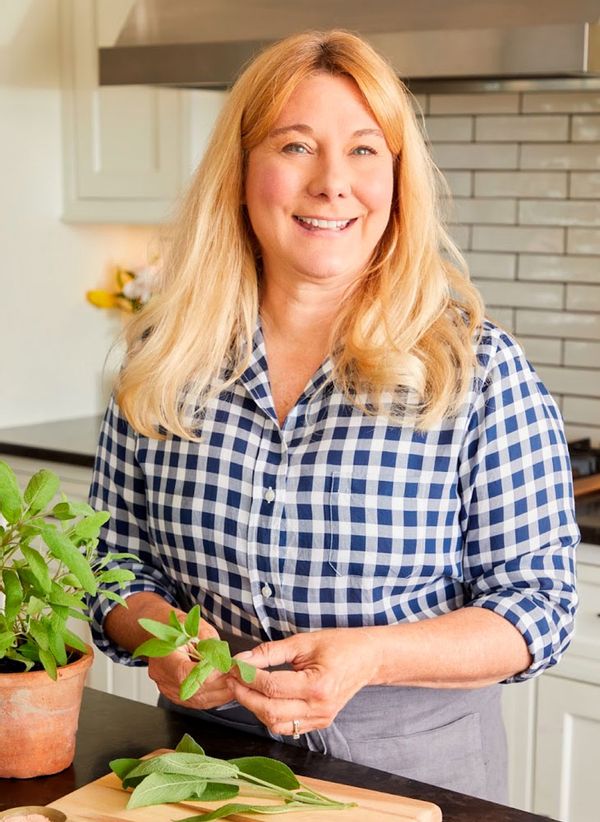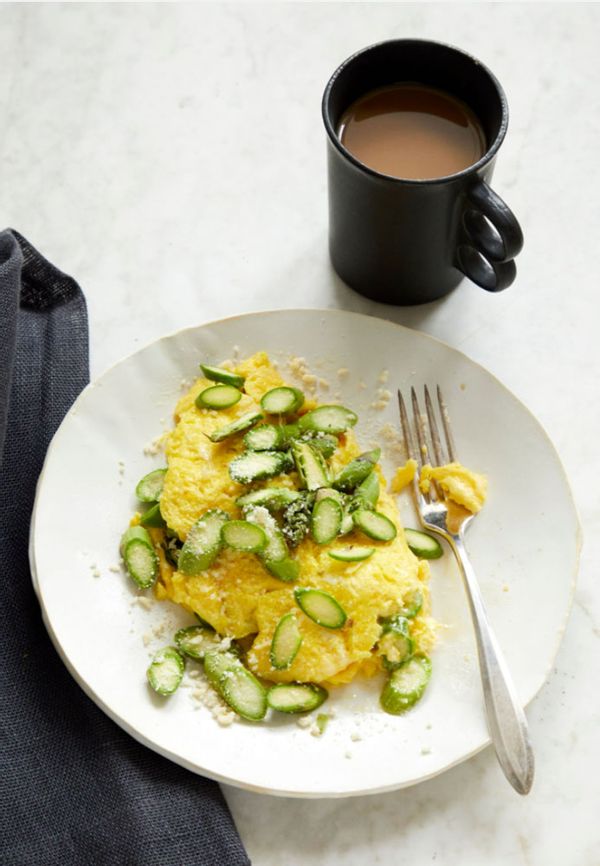
Eggs have obviously been a hot topic the past few months.
Whether you've railed against their sky-high prices (and the contested justifications behind them), recently enjoyed a terrific scramble or happily dyed some eggs for Easter a few weeks back, it's safe to say that eggs have existed in your world recently (this doesn't extend to my mother or my brother, who coincidentally both don't eat eggs? Savages).
While we're here, I should also note that, interestingly enough, "egg day" was the single lesson I messed in culinary school due to a large snow storm that made commuting to the city nearly impossible. While my egg cookery is certainly more than sufficient, I'd say that (prepare for a vulnerable moment) it's one area of cooking that I don't feel especially adept in. The other is pastry overall — which is a conversation for another day.
Anywho, this is all to say, eggs are important! We should all know how to cook and use them. Whether you're feverishly consuming omelets on a daily basis or you strictly only eat eggs in baked goods, it's safe to say you've probably eaten a few lately (unless, of course, you abstain from animal products altogether).
In order to get a bit more information on eggs overall, egg cookery and the entire concept of raising chickens so you have an near-endless supply of eggs (and don't need to spend an arm and a leg on them at the store), Salon Food spoke with Lisa Steele, 5th generation chicken keeper, the author of The Fresh Eggs Daily Cookbook (HarperCollins, 2022) and the "Queen of the Coop."

What are your favorite springtime egg dishes?
Eggs in general are symbols of spring — new life, rebirth, etc. — but also because our chickens start laying again in the early spring after taking off the winter, so the excitement of seeing that first egg of the season laying gently cushioned in the nest means I can start baking again in earnest and eating eggs again for breakfast every day!
I love pairing typical spring flavors/ingredients with eggs — asparagus, lemon, microgreens — and some of the first things I generally make each spring are mayonnaise (homemade mayonnaise is so different than store bought), lemon curd and Eggs Benedict with Hollandaise. A particular favorite spring recipe of mine is Asparagus with Parmesan and Hollandaise Sauce.

It's been a tricky few months (to say the least) when it comes to exorbitant egg prices — for someone looking to possibly become a "chicken keeper," what are your tips for starting? How do you begin the process of acquiring, as well as raising chickens?
I definitely recommend that anyone interested in getting started with chickens find out the regulations in their municipality before they do anything. Some rural areas don't allow flocks, while many urban areas are starting to, so don't assume anything. Some towns require a permit for the chickens, the coop or both and might have restrictions on the number of chickens, hen-only flocks or where the coop can be located.
Once you've sorted out the regulations, do some research into various breeds — although there's really no "wrong" or "right" breeds, just what's important to you (i.e. cold-hardiness, heat tolerance, temperament, size, egg color or production, etc.) or just visit your local feed store and take a look at their selection. The hatchery websites, such as Meyer Hatchery, have wonderful breed information to help you narrow down what kinds of chickens you might want to raise. A variety of breeds is going to be more fun.
Before you bring your chicks home, you'll need a "brooder" for them, which can be as simple as a cardboard box or plastic tote, with a heat lamp to keep them warm for the first few weeks before they grow in their feathers, a chick-sized feeder and waterer and some bedding for the tote.
Once you get your chicks, the stopwatch will start ticking and you've got about 8 weeks until they're big enough to go outside, so you'll need to buy or build a coop for them to live in with nesting bars for them to perch on at night to sleep and nesting boxes for them to lay their eggs in. Having an attached pen or run for them to spend the day in so they're safe from predators is also a good idea.
Check out a few reputable websites (like www.fresheggsdaily.com) and pick up a few books to learn about the finer points of raising a happy, healthy backyard flock.
Do you use eggs in savory, sweet or breakfast methods the most?
Oh that's a tough one. On a typical day, I will cook up some eggs for breakfast, usually either scrambled or a quick omelet, then I might do some baking in the middle of the day, then use eggs in a meatloaf or hard-boiled on top of a salad. We often will have "breakfast for dinner" when eggs are plentiful, so a couple of fried eggs, buttered toast and bacon.
What is your absolute favorite egg recipe?
I have two. You can't expect me to choose just one can you? On the savory side, I would have to say Eggs Benedict. It's my favorite way to enjoy eggs for breakfast or brunch. A perfectly poached egg on top of a piece of rustic toast with rich Hollandaise sauce is a work of art, not to mention delicious.
On the sweet side, I would go with Creme Brulee. The simplicity of just the four basic ingredients that come together so perfectly can't be beat.
Is there an egg recipe that you think some people are intimidated by — but shouldn't be? Conversely, is there a tricky egg technique that is an especially challenging approach?
Again, I would have to say Eggs Benedict. I think that some people are intimidated by the thought of making their own Hollandaise sauce. I would say that many are surprised when they realize its not hard at all. It can break pretty easily, but it's still going to taste good! I think the most difficult thing about making Eggs Benedict is actually the timing of it all. Not the individual components. Each on it's own is relatively easy to make, it's the thought of getting everything to be ready at the same time.
When recipes call for "large eggs," what does that really mean?
Eggs that are sold commercially are graded by weight. The sizes for chicken eggs range from PeeWee, Small, Medium, Large, Extra-large and Jumbo. The weights refer to the total carton weight, so within that carton, an individual egg might weigh a bit more or less than the average.
Most recipes call for large eggs which means a carton of 12 eggs that weighs 24 ounces (or an average of two ounces per egg). If you're using farm fresh eggs, you can weigh out two ounces for each chicken egg a recipe calls for. Same if you're using duck or goose eggs. You can whisk the eggs in a bowl then weigh out two ounces of egg for each egg in the recipe.

When it comes to the "buzzwords" associated with egg purchasing, which ones are legitimate and which ones are fluff?
Oh that's a great question! Egg cartons have become billboards these days, just covered with all sorts of phrases and words, many of which are purely marketing ploys.
Words you can ignore include:
- Natural — all eggs are natural
- Non-GMO — neither chickens or eggs have been genetically modified
- Antibiotic or hormone-free — laying hens aren't given antibiotics or hormones
- Vegetarian-fed — chickens are omnivores, not vegetarians
- Fresh or farm fresh — no actual meaning, purely a marketing ploy
- Local — all it means is that the eggs have to have been laid within 400 miles of where they are put in the carton — not exactly "local", is it?
- Cage free — while its true that the hens aren't confined to tiny cages, they actually have a higher mortality rate and suffer more aggression than caged hens since they're still all just crammed into a warehouse
- Free Range — this merely means that the hens have access to the outdoors, but doesn't specify if that's a cement slab or a pasture and doesn't guarantee that a hen will actually ever step foot outside in her lifetime
Words that have meaning include:
- Certified humane — these farms adhere to strict guidelines about how the laying hens are feed and housed
- Pasture raised — this is the gold standard when it comes to hen welfare since they hens spend the majority of their time outdoors foraging for bugs and weeds
- Organic — if eating an organic diet is important to you, then this is a label to look for
- Omega-3 enriched — adding flax to a hen's diet allows her to direct some of those omega 3-s to her eggs
Do you have a preference on egg color?
I love blue eggs. Even though egg color has no effect on the nutrition or taste of an egg, the blue eggs are just so pretty. But they're also so hard to crack open to use because they are so pretty. I was raised on brown eggs from my grandparents farm and grew up with the jingle "brown eggs are local eggs and local eggs are fresh", so I am sort of predisposed to prefer brown eggs to white. To me, they do just seem fresher!

Do you have a number-one favorite egg preparation method?
For my cookbook, I really wanted to perfect my omelet-making skills. I made so many omelets in so many different pans over the course of the two years while I was writing the book. I have to say that there's a sense of immense pride when you make a perfect omelet. So, I would say a classic French tri-fold omelette would be my favorite way to prepare eggs.







